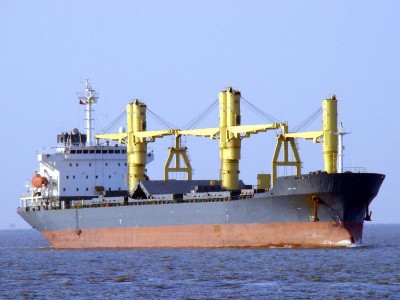WASHINGTON, D.C. – Two Greek shipping companies were sentenced Thursday to pay corporate penalties totaling $2.7 million after being convicted on federal charges connected to a cargo ship discovered to have made illegal discharges of oily waste to the marine environment.

Each company was ordered to pay part of its penalty to Gray’s Reef National Marine Sanctuary in the case stemming from an inspection of the M/V Ocean Hope conducted by the U.S. Coast Guard at the North Carolina Port of Wilmington in July 2015. During that inspection, senior engineers for the companies tried to hide that the vessel had been dumping oily wastes into the ocean for months.
Supporter Spotlight
Oceanfleet Shipping Limited, the vessel’s operator, was sentenced to pay a $1.35 million fine and make a $450,000 community service payment to Gray’s Reef. Oceanic Illsabe Limited, the vessel’s corporate owner, was sentenced to pay a $650,000 fine and make a $250,000 community service payment to the reef. Each company was placed on a five-year term of probation and barred from sending ships to U.S. ports until its financial penalty has been satisfied.
The sentence was announced by Assistant Attorney General John C. Cruden for the Justice Department’s Environment and Natural Resources Division and U.S. Attorney John Stuart Bruce for the Eastern District of North Carolina.
“We are pleased with the substantial penalties imposed by the court, which reinforces that pollution doesn’t pay,” Cruden said. “We will continue to protect United States ports and waters, and uphold our treaty obligations, by vigorously prosecuting companies that dump oil at sea and then try to mislead U.S. Coast Guard inspectors with false statements and documents.”
The operation of commercial marine vessels generates large quantities of waste oil, oil-contaminated wastewater and oil sludge. International and U.S. law forbid the discharge of oily wastes into the ocean. Should any overboard discharges occur, they must be documented in an official oil record book that is regularly inspected by the Coast Guard.
The evidence at trial demonstrated that the companies maintained a lax “paper” compliance regime focused on avoiding liability rather than adequately training and supervising engineers. The companies failed to follow their own environmental policies and ignored important red flags, such as the vessel’s failure to offload oil sludge for many months and its rare use of a pollution-prevention device known as an oil-water separator. The regular dumping of tons of bilge water into the ocean continued for at least six months.
Supporter Spotlight
On at least two occasions, senior engineers conspired to connect a flexible hose, known in the industry as a “magic pipe,” to discharge tons of heavy oil sludge. The most recent discharge occurred in June 2015, as the vessel headed for U.S. waters. Coast Guard inspectors and laboratory testing confirmed the presence of heavy oils in the vessel’s overboard discharge piping.
When the Ocean Hope arrived at the Port of Wilmington, the companies’ engineers ordered subordinates to lie to Coast Guard inspectors and to cover up evidence. The vessel’s chief engineer presented inspectors with a doctored oil record book, in which false accountings of the ship’s production and disposal of oily wastes were recorded.
“Our office was pleased to partner with the Department of Justice’s Environment and Natural Resources Division in this significant case and, pleased that the corporations responsible for this pollution were held accountable,” said U.S. Attorney Bruce. “We will continue to vigorously enforce federal laws designed to prevent the pollution of the world’s oceans.”
Though managed from Greece, Oceanic is registered in Liberia and had no significant assets besides the Ocean Hope, which was sold for scrap shortly after the indictment of this case. Oceanic and Oceanfleet are believed to be closely affiliated companies controlled by the same corporate principles out of Athens, Greece. During the period when the Ocean Hope was dumping oil into the ocean, Oceanfleet managed 10 or 11 vessels.
The vessel’s two top engineers were previously convicted and sentenced to serve prison sentences in connection with these crimes.







